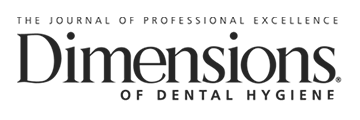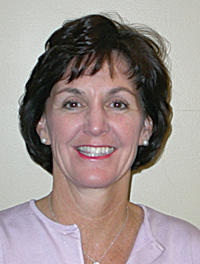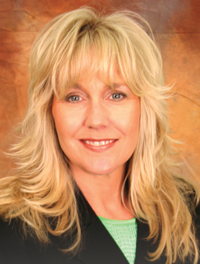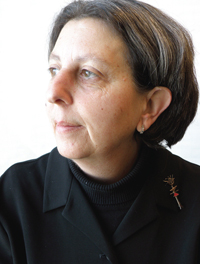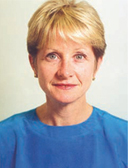
Kathy Lituri, RDH, MPH, is a clinical instructor and oral health promotion director in the Office of Global and Population Health at Boston University (BU) Goldman School of Dental Medicine. Her extensive experience in public health has led to her committed involvement in service learning and community-based oral health education and promotion activities, such as the Healthy Baby/Healthy Child Program. Lituri lectures in pre- and postdoctoral courses in preventive dentistry, serves as a clinical examiner in various research studies, recruits and fosters volunteer dental students, presents at professional meetings and conferences, and maintains a special interest in the multicultural delivery of oral health care.
Lituri is active in the Oral Health Section of the American Public Health Association (APHA) and is the group’s immediate past chair. She currently serves as a governing councilor and member of the Inter-Sectional Steering Committee. At the 2015 APHA annual meeting in Chicago, she spoke at the opening session in honor of the 70th anniversary of community water fluoridation. This marked the first time the chair of a section, special interest group, caucus, or forum was invited to speak at the APHA’s opening session.
Passionate about community water fluoridation, Lituri participated in a successful pro-fluoridation campaign in Lincoln, Massachusetts, in the spring of 2013. Since then, she has provided expertise to other communities facing challenges to their water fluoridation programs.
What has your educational journey been like?
My academic path was anything but a straight line. I knew that I wanted to do more than practice clinically, so while working as a dental hygienist in a pediatric dental practice, I took a variety of night classes at the Harvard Extension School and Northeastern University. In 1988, shortly after the birth of my first son, I went to work as a dental hygienist at Children”s Hospital Boston. It was there that my journey in public health began. My job had a public health component that enabled me to meet other professionals involved in the field who advised me on career opportunities. Children”s Hospital offered tuition remission, so I went back to school part time to earn a bachelor”s degree while working full time and What has your educational journey been like? My academic path was anything but a straight line. I knew that I wanted to do more than practice clinically, so while working as a dental hygienist in a pediatric dental practice, I took a variety of night classes at the Harvard Extension School and Northeastern University. In 1988, shortly after the birth of my first son, I went to work as a dental hygienist at Children”s Hospital Boston. It was there that my journey in public health began. My job had a public health component that enabled me to meet other professionals involved in the field who advised me on career opportunities. Children”s Hospital offered tuition remission, so I went back to school part time to earn a bachelor”s degree while working full time and raising two young children. In 1999, I began earning my master’s degree in public health while working at BU Goldman School of Dental Medicine.
What sparked your interest in public health?
My job at Children”s Hospital took me into two community elementary schools. It was there that I realized how many children do not have access to dental services. The position also connected me with teachers, social workers, school administrators, and nurses who helped shine a light on the barriers that make it difficult, if not impossible, for low-income families to maintain good oral health, prevent dental disease, and obtain preventive and restorative dental services.
Community water fluoridation is one of your passions. How did you get involved in promoting it, and what can dental hygienists do to support it?
Up until 21⁄2 years ago, I always thought of community water fluoridation as a nonissue because I assumed most cities and towns had it. In the spring of 2013, my hometown faced a challenge to its water fluoridation program and I ended up taking the lead to ensure it continued to provide its residents with fluoridated tap water. The campaign was successful, but the experience made me realize firsthand how complacent many of us have become about community water fluoridation and how much misinformation is propagated on the internet and social media. I decided to never be in a reactive position again and that public health professionals—not just oral health care providers—should be ready to defend community water fluoridation.
Dental hygienists should stay up to date with the most current information regarding community water fluoridation, remain aware of what its opponents are saying, and understand the challenges facing their communities. Dental hygienists, with their background in patient education, are perfectly poised to talk to patients, neighbors, community leaders, and policy makers about the benefits of drinking fluoridated tap water. Dental hygienists can be active on their local boards of health and serve as resources for their communities.
When you earned your dental assisting certificate in 1973, did you envision you would complete a master’s degree in public health in 2003?
No, I am not even sure I knew what public health was back then! During high school, I worked as a dental assistant, and I always knew I wanted to complete dental hygiene school. Initially, however, I was waitlisted so I decided to take the dental assisting course as a way to formalize what I had learned on the job and to make myself more marketable when it came time to find employment.
What is a typical workday like for you?
In my role at Boston University Goldman School of Dental Medicine, every day is different. As the oral health promotion director, I plan and implement an average of 70 community-based oral health activities/events targeted to at-risk populations per year. Volunteer dental students staff most of the activities. While there are common elements and some events take place on a regular basis, every community is different, every event is different, and every group of volunteer students is different. I also oversee a community outreach project requirement for fourth-year dental students, and I provide dental screenings and fluoride varnish applications to hundreds of children in local preschools.
Additionally, I lecture several times a year; participate as a member of several committees in the community; and am active in the Oral Health Section of the American Public Health Association (APHA). This morning, I accompanied three third-year dental students to a preschool to provide dental screenings and fluoride varnish applications. This afternoon, I provided feedback to seven students on their community outreach projects, placed a supply order for several upcoming events, and prepared for a large community event on Friday.
Which of your accomplishments are you most proud of?
I am proud to be involved with the Oral Health Section of the APHA. After joining in 2000, I have served as secretary, section councilor, program planner, and, most recently, chair of the section from 2013 to 2015. For the next 2 years, I will serve as governing councilor. This past fall, as chair of the Oral Health Section, I had the honor of recognizing the 70th anniversary of community water fluoridation in front of 5,500 people during the opening general session of the 143rd APHA Annual Meeting in Chicago.
What advice would you give dental hygienists who are interested in public health?
Dental hygiene education and licensure provide a solid foundation for public health, regardless of which specialty you choose. It is an ideal way to use your dental hygiene expertise outside of the operatory, to broaden your perspective to include whole health, and to learn and collaborate with health professionals across a wide range of disciplines. Public health provides avenues to fulfill needs in your community. The opportunities are endless!
